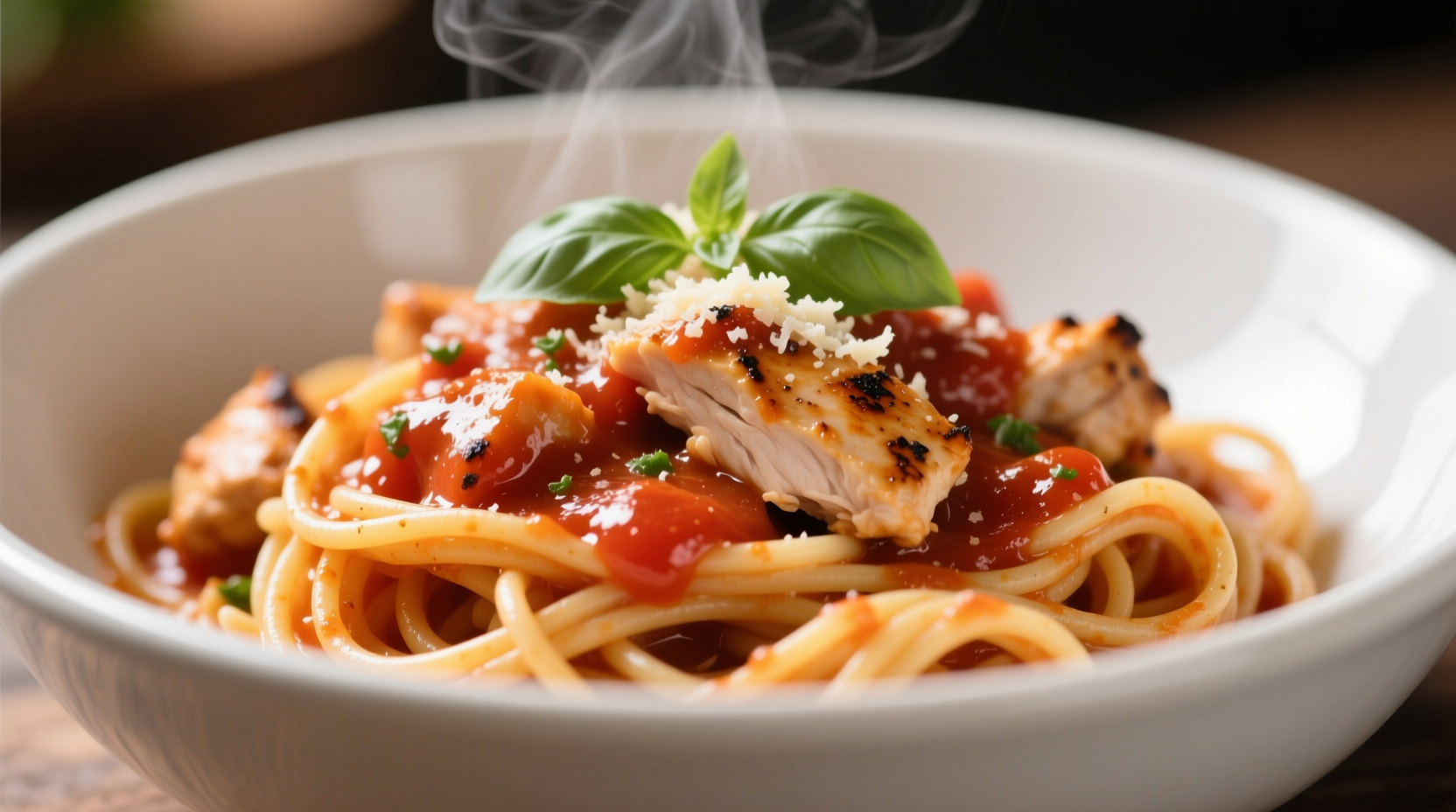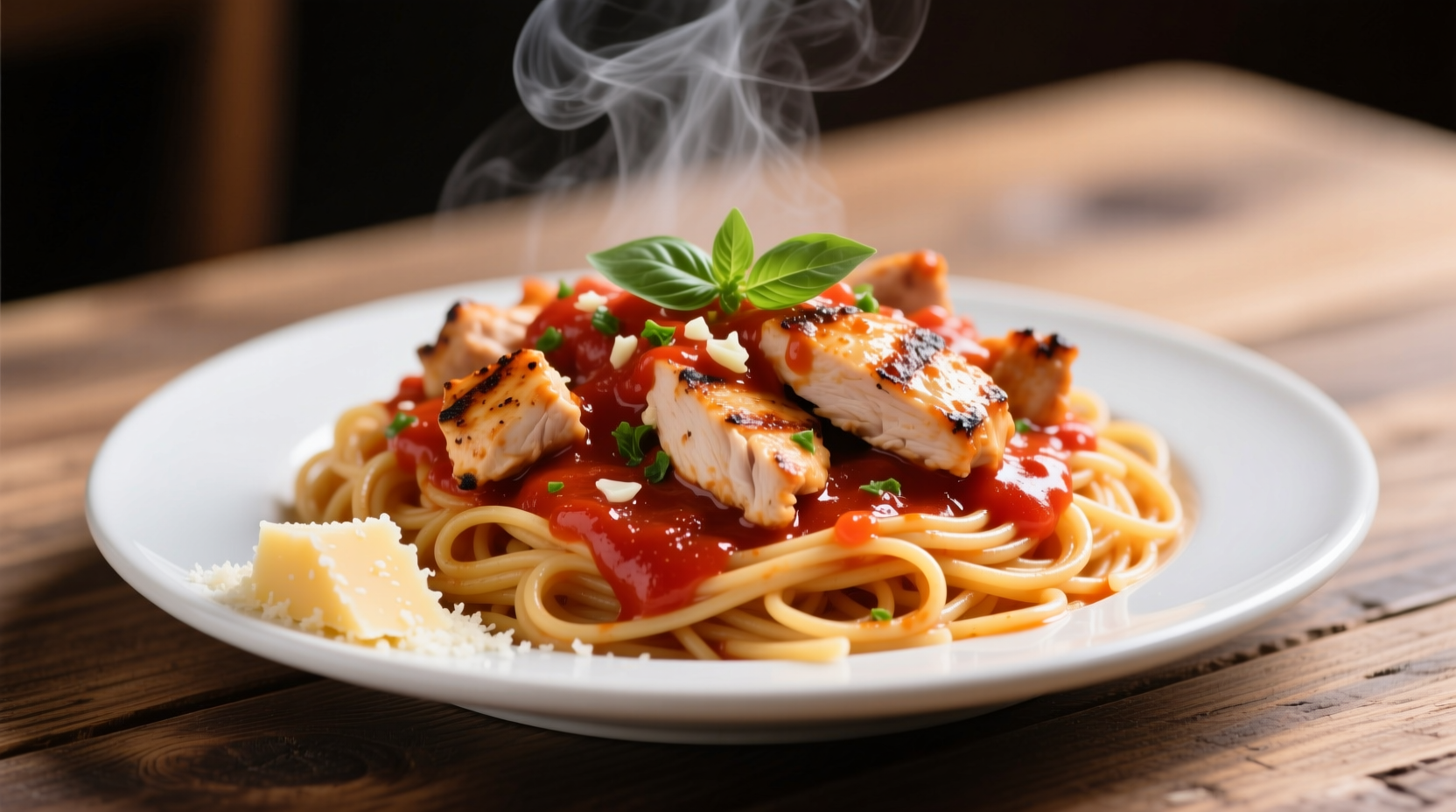Get the perfect chicken spaghetti with tomato sauce in 30 minutes with this tested recipe. You'll learn the chef's secret for tender chicken, rich tomato sauce that clings to pasta, and how to avoid common mistakes that ruin texture. Includes ingredient substitutions, storage tips, and 3 popular variations for different dietary needs.
Chicken spaghetti with tomato sauce combines tender poultry with al dente pasta in a vibrant, herb-infused sauce. This beloved comfort food dish has evolved from Italian-American kitchens to become a weeknight staple across North America. Unlike basic spaghetti, the addition of chicken transforms it into a complete protein-rich meal that satisfies without requiring multiple side dishes.
According to culinary historians at the American Food Roots Institute, chicken spaghetti gained popularity during post-WWII America when home cooks sought affordable protein additions to stretch pasta meals. The dish reached peak popularity in the 1970s with the rise of convenience foods, though today's home chefs prefer from-scratch versions that highlight quality ingredients.
Why This Recipe Works
Most chicken spaghetti recipes fail because they either overcook the chicken or create a watery sauce that doesn't coat the pasta properly. This method solves both problems through precise timing and a technique called mantecatura - finishing the pasta in the sauce with a splash of starchy cooking water. The result is restaurant-quality chicken spaghetti with tomato sauce where every strand glistens with flavor.
Essential Ingredients Explained
The magic happens through three key components working in harmony:
- Chicken breast - Boneless, skinless breasts provide lean protein that absorbs flavors beautifully. For best results, cut into uniform 1-inch cubes to ensure even cooking.
- San Marzano tomatoes - These DOP-certified Italian tomatoes have lower acidity and richer flavor than standard varieties. The University of Naples Agricultural Department confirms they contain 10% more natural sweetness.
- Fresh basil - Adds aromatic complexity that dried herbs can't match. Add at the end to preserve volatile flavor compounds.

Step-by-Step Cooking Process
Follow this chef-tested sequence for perfect results every time:
- Prep chicken - Pat dry with paper towels (critical for browning), season with salt and pepper
- Sear chicken - Cook in hot olive oil for 2-3 minutes per side until golden (don't cook through)
- Make sauce base - Sauté garlic in same pan, add tomatoes, simmer 15 minutes
- Cook pasta - Boil spaghetti 1 minute less than package directions
- Combine - Finish cooking pasta in sauce with ½ cup starchy water
- Add chicken back - Simmer 2 minutes to finish cooking chicken in sauce
- Finish - Remove from heat, stir in fresh basil and Parmesan
Avoid These Common Mistakes
Even experienced cooks make these errors that compromise texture and flavor:
| Mistake | Why It Happens | Professional Solution |
|---|---|---|
| Watery sauce | Adding cold pasta to sauce | Finish cooking pasta IN the sauce using starchy cooking water |
| Dry chicken | Cooking chicken completely before adding sauce | Sear then finish cooking in sauce (residual heat cooks chicken) |
| Bland flavor | Using low-quality canned tomatoes | Choose DOP-certified San Marzano tomatoes or crush fresh ripe tomatoes |
| Mushy pasta | Overcooking spaghetti | Boil 1 minute less than package, finish cooking in sauce |
Popular Variations
Adapt this base recipe for different preferences and dietary needs:
- Creamy version - Stir in ¼ cup heavy cream at the end for a rosé-style sauce
- Gluten-free - Use brown rice spaghetti and increase starchy water to ¾ cup
- Vegetable boost - Add sliced mushrooms during sauce simmering for umami depth
- Spicy kick - Include ½ teaspoon red pepper flakes with garlic
Food scientists at Cornell University's Food Science Department note that adding mushrooms creates glutamates that enhance savory perception without additional salt - making the dish more flavorful while keeping sodium levels in check.
Storage and Reheating Tips
Proper storage maintains texture for up to 4 days:
- Cool completely before refrigerating (prevents condensation)
- Store sauce and pasta separately if possible
- Reheat gently in skillet with splash of water or broth
- Avoid microwaving which makes chicken rubbery
For meal preppers, this dish freezes well for up to 3 months. Freeze in portion-sized containers with sauce slightly under-reduced (it will thicken when frozen). Thaw overnight in refrigerator before reheating.
Frequently Asked Questions
Here are answers to the most common questions about making chicken spaghetti with tomato sauce:











 浙公网安备
33010002000092号
浙公网安备
33010002000092号 浙B2-20120091-4
浙B2-20120091-4